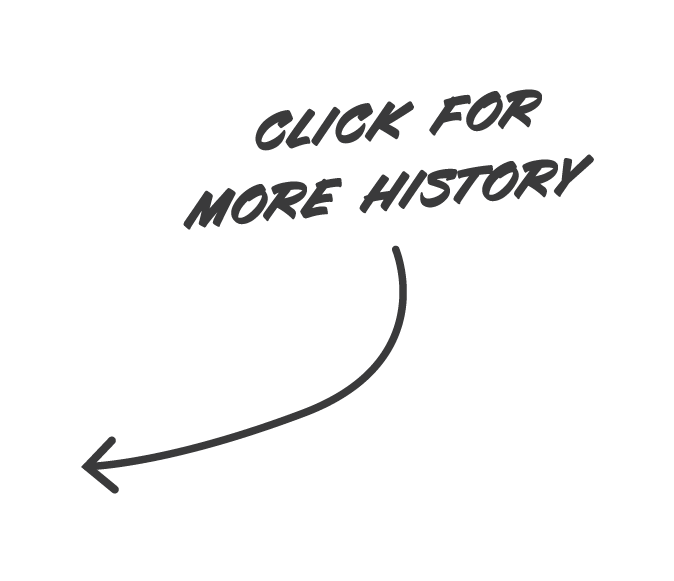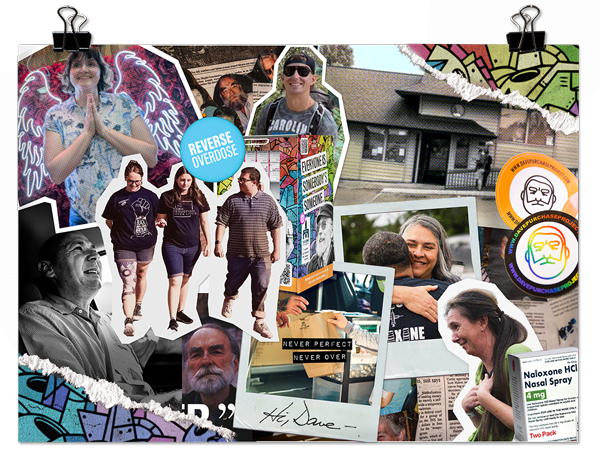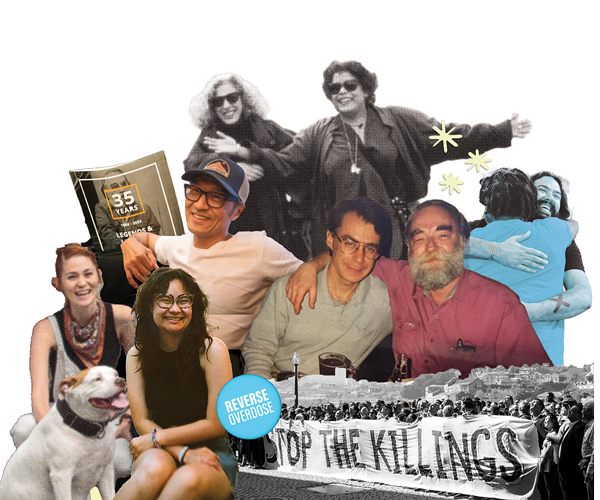What We Do Today
With the nation’s first legally sanctioned needle exchange and the first at-cost harm-reduction supply co-op, the Dave Purchase Project has been at the forefront of leading and supporting the harm-reduction community. Originally known as Point Defiance AIDS Projects, we began with the simple belief, "The Point is the Point."
Our founder, Dave Purchase, was right. Decades later, needle exchange has been proven to have significantly reduced the spread of HIV as well as other blood-borne pathogens. Today, with your support, we’re addressing everything from the opioid epidemic to the resurgence of hepatitis to the negative impacts from the housing crisis. Our mission continues to foster inclusion rather than exclusion, prioritizing the voices of those we serve and creating pathways for positive change for everyone within the harm reduction community and beyond.
History of our Movement Past + Present
Share your harm reduction historical moment with us as we document the rich history of our collective movement. Together we can honor our past while shaping our future. Thank you for being part of history past and present.
THE BEGINNING
Dave Purchase set up a TV tray and a folding chair near a house frequented by heroin users in downtown Tacoma, WA. He exchanged clean needles for used — to anyone who wanted them, no questions asked.

1961 (March)
Dr. Jack Fishman and Dr. Mozes J. Lewenstein applied for one of the first patents for naloxone.
1964
Opioid agonist therapy for opioid dependence officially introduced in Canada.
Ebil et al. The State of Opioid Agonist Therapy in Canada 20 Years After Federal Oversight, Can J Psychiatry v.62(7); 2017.
1967
Haight-Ashbury Free Clinic, the first free clinic in the United States, opened.
1969
Dave Purchase began working with people who use drugs as an outreach worker and public health education specialist in Tacoma, WA.
1969
Berkeley Free Clinic opened and offered an information line for people who use drugs.
https://www.berkeleyfreeclinic.org/history (Accessed 09.04.24) https://www.fifthestate.org/archive/404-summer-2019/berkeley-free-clinic-at-50/ (Accessed 09.10.24)
1971
FDA approved Naloxone for use in reversing opioid overdose.
Bennett AS, Elliott L. Naloxone's role in the national opioid crisis-past struggles, current efforts, and future opportunities. Transl Res. 2021 Aug;234:43-57. doi: 10.1016/j.trsl.2021.03.001. Epub 2021 Mar 5. PMID: 33684591; PMCID: PMC8327685.
1972
Dave designed a pilot residential drug treatment program called the Community at Fort Lewis, in Tacoma, WA. For the next several years, he directed the Bridge Program, a NIMH-funded residential treatment program and managed by the Tacoma Narcotic Center, serving soldiers returning from Vietnam.
1976
Dave was appointed co-director of The Tacoma Narcotic Center. He later became the director and served in this capacity until 1983 when he was hit by a drunk driver and forced into medical retirement.
1981 (January)
Nico Adriaans founded the “Junkiebond” or “Junkie’s Union,” an underground needle and syringe programme (NSP) in Rotterdam, Netherlands, with the aim of protecting people who inject drugs from hepatitis B.
https://idpc.net/news/2017/02/a-brief-history-of-drug-user-self-organisations (accessed 09.04.24)
1983
HIV retrovirus identified as the cause of AIDS.
Barré-Sinoussi F, Chermann JC, Rey F, Nugeyre MT, Chamaret S, Gruest J, Dauguet C, Axler-Blin C, Vézinet-Brun F, Rouzioux C, Rozenbaum W, Montagnier L. Isolation of a T-lymphotropic retrovirus from a patient at risk for acquired immune deficiency syndrome (AIDS). Science. 1983 May 20;220(4599):868-71. doi: 10.1126/science.6189183. PMID: 6189183.
Gallo RC, Sarin PS, Gelmann EP, Robert-Guroff M, Richardson E, Kalyanaraman VS, Mann D, Sidhu GD, Stahl RE, Zolla-Pazner S, Leibowitch J, Popovic M. Isolation of human T-cell leukemia virus in acquired immune deficiency syndrome (AIDS). Science. 1983 May 20;220(4599):865-7. doi: 10.1126/science.6601823. PMID: 6601823
1983
The first U.S. Conference on AIDS is held in Denver, CO.
1983
Jon Parker, Yale student and former heroin user, began publicly distributing sterile needles to intravenous drug users in New Haven, CT.
McLean K. The biopolitics of needle exchange in the United States. Crit Public Health. 2011 Mar 1;21(1):71-79. doi: 10.1080/09581591003653124. PMID: 22389572; PMCID: PMC3291106.
1984
Streetwork Project starts conducting outreach to homeless youth in NYC.
1984 (July 13)
MMWR Report from the CDC states that avoiding injection drug use and reducing needle-sharing “should also be effective in preventing transmission of the virus.”
MMWR July 13, 1984 / 33(27);377-9
1985 (August)
Dr. Mathilde Krim and Dr. Michael Gottlieb founded amfAR. Elizabeth Taylor named the Founding National Chairman.
https://www.amfAR.org/about-amfar/a-brief-history-of-amfar/ (Accessed 09.10.24)
1985
Condoms are proven to prevent the spread of HIV.
Voeller B, Potts M. Has the condom any proven value in preventing the transmission of sexually transmitted viral disease – for example acquired immune deficiency syndrome? Br Med J. 1985;291:1196.
Conant M, Hardy D, Sernatinger J, Spicer D, Levy JA. Condoms prevent transmission of AIDS-associated retrovirus (Letter). JAMA 1986;255:1706.
1986 (October)
Allan Parry and associates founded the first syringe exchange program in Liverpool, England.
https://www.drugwise.org.uk/wp-content/uploads/Needle-swap-in-Mersey.pdf (Accessed 09.10.24)
1986
CDC began funding AIDS Community Demonstration Projects, which offer HIV antibody testing and counseling to groups at higher risk of contracting HIV.
https://www.ncbi.nlm.nih.gov/pmc/articles/PMC1580338/ (Accessed 09.11.24)
1986 (June)
Bern, Switzerland opened a syringe exchange that evolved into the first safe injection site.
The global health and equity imperative for safe consumption facilities, Beletsky, Leo et al. The Lancet, Volume 392, Issue 10147, 553 - 554.
European Monitoring Centre for Drugs and Drug Addiction. Drug consumption rooms: an overview of provision and evidence. July 7, 2018. http://www.emcdda.europa.eu/system/files/publications/2734/POD_Drug%20consumption%20rooms.pd (Accessed 09.08.24)
1987
Russell Newcombe coined the term “harm reduction” to describe a new pragmatic approach being employed in Merseyside (Liverpool), England for engaging people who use drugs.
Druglink: The Journal on Drug Misuse in Britain, vol. 2 Issue 1, January/February 1987.
https://www.theguardian.com/politics/2024/apr/28/russell-newcombe-obituary (Accessed 09.04.24)
1987 (April)
Syringe Exchange became the official policy of UK Government.
Syringe Exchange Schemes For Drug Users In England And Scotland Gerry V. Stimson, Lindsey Alldritt, Kate Dolan and Martin Donoghoe, BMJ,(Clinical Research Edition) Vol. 296, No. 6638 (Jun. 18, 1988), pp. 1717-1719
1987 (March)
Larry Kramer, Vito Russo, and Didier Lestrade founded the AIDS Coalition to Unleash Power (ACT UP) NYC in response to the US government's completely inadequate response to the burgeoning HIV/AIDS crisis.
ACT UP New York Records, Manuscripts and Archives Division, The New York Public LIbrary. https://archives.nypl.org/mss/10 (Accessed 09.10.24)
1988
US Congress banned the use of federal funds to purchase syringes.
1988
David Acosta founded the Gay and Lesbian AIDS Education Initiative (GALAEI) in Philadelphia, PA.
https://www.galaeiqtbipoc.org/about-us/our-history/ (Accessed 09.10.24)
1988
The first needle exchange run by New York City, Dept. of Public Health opened.
Anderson W. The New York Needle Trial: the politics of public health in the age of AIDS. Am J Public Health. 1991 Nov;81(11):1506-17. doi: 10.2105/ajph.81.11.1506. PMID: 1951815; PMCID: PMC1405677.
1988
Allan Parry visited NYC and met Edith Springer, who became an early evangelist of harm reduction in the US and eventually trained more than 30,000 people in harm reduction techniques during her career.
Szalavitz, Maia, Undoing Drugs (New York: Hachette, 2021), 58.
1988 (August 9)
Dave Purchase started the Tacoma Needle Exchange.
1989
Renee Edginton and AIDS activists started an underground exchange called Clean Needles Now in Los Angeles, California.
1989
ACT UP Seattle informed the King County Health Department that it planned to open a needle exchange and wanted the health department to operate it. Six weeks later, the department did.
https://www.historylink.org/file/20871 (Accessed 09.10.24)
THE FOUNDING
Dave joined with a handful of like-minded folks to form the Point Defiance AIDS Project – the first legal exchange in the U.S. The mission? To stem the tide of AIDS one life and one syringe at a time.
1990
Harm Reduction International Conference held in Liverpool.
1990
The first state-endorsed syringe exchange program in Hawaii started.
https://health.hawaii.gov/harmreduction/syringe-service-programs/ (Accessed 09.10.24)
1990
Activists in Berkeley, CA began needle distribution out of a baby carriage, birthing Needle Exchange Emergency Distribution (NEED).
https://www.berkeleyneed.org/about/index.php (Accessed 09.10.24)
1990
Department of Public Health in New Haven, CT began a needle exchange program.
https://www.ncbi.nlm.nih.gov/books/NBK232343/#ddd00174 (Accessed 09.10.24)
1991
Harm Reduction International Conference held in Barcelona.
1991 (August)
Francie Comer saw an interview of Dave Purchase discussing syringe exchange on MacNeil/Lehrer.
1991 (November)
amfAR funded 5 SSPs in NYC.
Szalavitz, Undoing Drugs, 141.
NASEN IS FORMED
The NASEN Directory was founded. To this day, NASEN is the oldest and most comprehensive list of Syringe Service Providers (SSPs) in the United States.
1992
Harm Reduction International Conference held in Melbourne.
1992 (January)
Dan Bigg and John Szyler founded the Chicago Recovery Alliance.
1992
Dave founded The North American Syringe Exchange Network (NASEN) which works to support new and existing harm reduction programs. He worked as the director of the Point Defiance Aids Projects (PDAP) until his passing in 2013.
1992
The first North American Syringe Exchange Convention (NASEC) was held in Tacoma, WA at the Sheraton Hotel.
1992
Spokane County Health District v. Brockett, 120 Wash. 2d 140, 839 P.2d 324 (Wa. 1992). “[I]t is legal for public health officials and regional directors of AIDS service networks, and those operating under their supervision, to exchange or distribute intravenous needles to those who may use them to inject illegal drugs, as part of an HIV/AIDS prevention program.”
https://supreme.justia.com/cases/federal/us/454/1022/ (Accessed 09.04.24)
1992
Strang and Farrell suggested distributing “ampules of opiate antagonist naloxone” for opioid overdose reversal.
Strang J, Farrell M. Harm minimisation for drug misusers. BMJ. 1992 May 2;304(6835):1127-8. doi:10.1136/bmj.304.6835.1127. PMID: 1392784; PMCID: PMC1882091.
1993
Harm Reduction International Conference held in Rotterdam.
1993
Comer Family Foundation funded the work of the Chicago Recovery Alliance.
Szalavitz, Undoing Drugs, 144.
1993 (October)
The first harm reduction working group meeting was held in San Francisco in 1993. In addition to Dave Purchase, the group consisted of Rod Sorge, Dan Bigg, Imani Woods, Stephanie Comer, Francie Comer, George Kenney, Sara Kershnar, Charles Collins, Jon Paul Hammond, Pat Garrett, Ricky Bluthenthal, Renee Edgington, Edith Springer, Joyce Rivera, Lisa Moore, Scott Stokes, George Clark, Delia Garcia, Heather Edney, Mark Gerse, Kevin Zeese, and Gerald Lenoir. The group worked together to create a unified definition of harm reduction and later became the National Harm Reduction Coalition (NHRC).
1993
Sacramento Area Needle Exchange (SANE) began underground needle exchange.
https://www.sciencedirect.com/science/article/abs/pii/S0955395903001464 (Accessed 09.10.24)
1994
Harm Reduction International Conference Held in Toronto.
1994
Marty Prairie and Michael Harney started The Needle Exchange Program of Asheville (NEPA).
https://dcr.lib.unc.edu/indexablecontent/c2c0f7b6-ec89-4ee8-8149-ca0b9b77ae5b (Accessed 09.10.24)
1994
AIDS Resource Center of Wisconsin opened The LifePoint needle exchange in Milwaukee, WI.
https://web.uwm.edu/lib-omeka-arcw/exhibits/show/arcw30/lpsuccess (Accessed 09.10.24)
LOCAL OUTREACH
Our local needle exchange serves Pierce County with clean syringes, testing, treatments, healthcare referrals and much more.
1995
North American Syringe Exchange Convention (NASEC) held in Puerto Rico.
1995
Harm Reduction International Conference held in Florence.
1995
Underground syringe exchange started in Fresno, CA.
https://www.ncbi.nlm.nih.gov/pmc/articles/PMC5189978/ (Accessed 09.10.24)
1995
The National Harm Reduction Coalition (NHRC) was created at the second meeting of the Harm Reduction Working Group.
1995
The Trip! Project, North America's first rave-based harm reduction group, was created.
https://tripproject.ca/about-us/ (Accessed 09.10.24)
1996
1st Conference of the National Harm Reduction Coalition took place in Oakland, CA.
1996
Harm Reduction International Conference held in Hobart.
1996
Women with a Point opened in Minneapolis, MN.
https://amycsullivan.net/wap/items/show/40 (Accessed 09.10.24)
1996
North American Syringe Exchange Convention (NASEC) held in Milwaukee.
1996
Dan Bigg and Sarz Maxwell started training people in overdose reversal and distributing naloxone to the public.
1997
North American Syringe Exchange Convention (NASEC) held in San Diego.
1997
Harm Reduction International Conference held in Paris.
1998
Harm Reduction International Conference held in Sao Paulo.
1999
Harm Reduction International Conference held in Geneva.
1999
Vermont legalized needle exchange.
https://legislature.vermont.gov/statutes/section/18/089/04478 (Accessed 096.10.2024)
2000
North American Syringe Exchange Convention (NASEC) held in Portland.
2000
Harm Reduction International Conference held in St. Helier.
2000
Vermont's first methadone clinic, the Chittenden Clinic, opened in Burlington, VT.
2001
North American Syringe Exchange Convention (NASEC) held in Minneapolis.
2001
Harm Reduction International Conference held in New Delhi.
2001
Congress allowed Buprenorphine treatment in doctors offices for opiate addiction treatment.
Section 1262 of the ‘Consolidated Appropriations Act of 2023’ removed the federal requirement for practitioners to apply for a special waiver prior to prescribing buprenorphine for the treatment of opioid use disorder.(https://www.samhsa.gov/medications-substance-use-disorders/waiver-elimination-mat-act) Accessed 09.09.24.
2002
North American Syringe Exchange Convention (NASEC) held in Albuquerque.
2002
Harm Reduction International Conference held in Ljubljana.
2002
Young Women's Empowerment Project, for young sex workers, began in Chicago, IL.
Hassan, Shira. Saving Our Own Lives: A Liberatory Practice of Harm Reduction. Chicago, 2022, Haymarket Books.
2003
Harm Reduction International Conference held in Chiang Mai.
2003
INSITE, North America's first legal safe injection site, started in Vancouver, Canada.
Doberstein, Carey, 'Insite in Vancouver: North America’s First Supervised Injection Site', in Evert Lindquist, and others (eds), Policy Success in Canada: Cases, Lessons, Challenges (Oxford, 2022; online edn, Oxford Academic, 15 Dec. 2022), https://doi.org/10.1093/oso/9780192897046.003.0004. (Accessed 9 Sept. 2024)
2004
Harm Reduction International Conference held in Melbourne.
2005
North American Syringe Exchange Convention (NASEC) held in Tacoma.
2005
Harm Reduction International Conference held in Belfast.
2006
Harm Reduction International Conference held in Vancouver.
2007
New Mexico Passed 911 Good Samaritan Law. This law specifically “protects people who seek help for a friend or family member who is experiencing a drug overdose and call 911”.
2007
Harm Reduction International Conference held in Warsaw.
2008
North American Syringe Exchange Convention (NASEC) held in Tacoma.
2008
Harm Reduction International Conference held in Barcelona.
2009
Harm Reduction International Conference held in Bangkok.
2009 (December 16)
President Obama lifted federal ban on syringes.
2010
North American Syringe Exchange Convention (NASEC) held in Austin.
2010
National Harm Reduction Conference (NHRC) held in Austin.
2010
Harm Reduction International Conference held in Liverpool.
2011 (December 6)
Republicans reinserted restrictive syringe language into the House-Senate compromise omnibus spending bill for FY2012.
https://www.congress.gov/bill/112th-congress/house-bill/2055 (Accessed 09.10.24)
2011
Harm Reduction International Conference held in Beirut.
2012
National Harm Reduction Conference (NHRC) held in Portland.
2013
Harm Reduction International Conference held in Vilnius.
2014
National Harm Reduction Conference (NHRC) held in Baltimore.
2014
National Study of Syringe Exchange Programs was renamed the Dave Purchase Memorial Survey of Syringe Exchange Programs.
2015
Harm Reduction International Conference held in Kuala Lumpur.
2015
Federal Ban on funding SSPs lifted - except funds still cannot be used to purchase syringes.
https://www.congress.gov/bill/114th-congress/house-bill/2029 (Accessed 09.10.24)
2015 (March 23)
FDA approved Narcan, 4 milligram (mg) naloxone hydrochloride nasal spray.
THE NEW ERA
The organization adopts a new name, The Dave Purchase Project, to reflect the spirit of our founder while allowing us to provide leadership on a larger range of public health issues.
2016
National Harm Reduction Conference (NHRC) held in San Diego.
2016 (September)
Tacoma Needle Exchange started training participants to reverse opioid overdose by administering naloxone.
2017
Harm Reduction International Conference held in Montreal.
2017
Tacoma Needle Exchange began distributing fentanyl test strips to participants.
2018 (April 25)
The Point Defiance Aids Projects (PDAP) Board of Directors approached the Purchase family and, with their blessing, renamed the organization Dave Purchase Project to honor the man who started it all.
2018
National Harm Reduction Conference (NHRC) held in New Orleans.
2019
Harm Reduction International Conference held in Porto.
2020 (December)
Tacoma Needle Exchange began distributing safer smoking supplies at our G Street Location.
2021 (November)
OnPoint NYC opened the first 2 Overdose Prevention Centers (OPCs) in the US.
NYTimes, Dec. 1, 2021, Section A, Page 17 of the New York edition with the headline: 2 Supervised Drug Injection Sites Open in New York.
2022
Dave Purchase Memorial Survey of Syringe Exchange Programs renamed the National Survey of Syringe Service Programs (NSSSP).
2023 (January)
Tacoma Needle Exchange began distributing free nasal naloxone via vending machines at 3 locations (a church, a public library, and a recovery-oriented organization) in Pierce County.
2023 (February)
Tacoma Needle Exchange Started offering drop-in drug checking services.
2023
Harm Reduction International Conference held in Melbourne.
2023
FDA approved nasal naloxone (Narcan brand) for over-the-counter (OTC) non-prescription sale.
2023 (November)
Tacoma Needle Exchange implemented a free drop-in street-medicine clinic.
2024
NASEN BC Online Catalog goes live for harm reduction programs.




